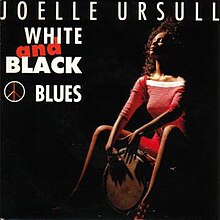White and Black Blues
| "White and Black Blues" | ||||||||||||||||||||||||||||||
|---|---|---|---|---|---|---|---|---|---|---|---|---|---|---|---|---|---|---|---|---|---|---|---|---|---|---|---|---|---|---|
 |
||||||||||||||||||||||||||||||
| Single by Joëlle Ursull | ||||||||||||||||||||||||||||||
| from the album Black French | ||||||||||||||||||||||||||||||
| B-side | Instrumental | |||||||||||||||||||||||||||||
| Released | 1990 | |||||||||||||||||||||||||||||
| Format | CD single, 7" single | |||||||||||||||||||||||||||||
| Recorded | 1990, France | |||||||||||||||||||||||||||||
| Genre | Pop | |||||||||||||||||||||||||||||
| Length | 3:00 | |||||||||||||||||||||||||||||
| Label | CBS | |||||||||||||||||||||||||||||
| Writer(s) |
Serge Gainsbourg, Georges Augier de Moussac |
|||||||||||||||||||||||||||||
| Producer(s) | Serge Gainsbourg | |||||||||||||||||||||||||||||
| Joëlle Ursull singles chronology | ||||||||||||||||||||||||||||||
|
||||||||||||||||||||||||||||||
|
||||||||||||||||||||||||||||||
"White and Black Blues" was the French entry in the Eurovision Song Contest 1990, performed in French (with some words in English) by Joëlle Ursull, from her album Black French. The song was performed fourteenth on the night of the competition. At the close of voting, it had received 132 points, tying for second place in a field of 22. "White and Black Blues" was co-written by French pop provocateur Serge Gainsbourg, who previously had composed France Gall's winning entry for Luxembourg in 1965, "Poupée de cire, poupée de son", as well as the Monegasque entry "Boum-Badaboum" for Minouche Barelli in 1967, which had finished fifth.
Composed by Georges Augier de Moussac with lyrics by Serge Gainsbourg, the song was originally titled "Black Lolita Blues", however Ursull, the first black woman to represent France at the Contest, declined to perform it due to the pejorative connotations of the word. The rewritten version met with her approval and has become something of a fan favourite.
The song itself deals with the need to overcome the prejudices of skin colour. Ursull sings that "When someone talks to me about skin colour/I have the blues which sends shivers down my spine/I feel as if I'm in a tale by Edgar Allan Poe". That said, she does not believe in relinquishing her connection to Africa entirely ("Africa, my love, I have you in my skin"), but admits that she faces difficulties in a white society ("We, the blacks/We're a few millions, a dime a dozen").
...
Wikipedia
